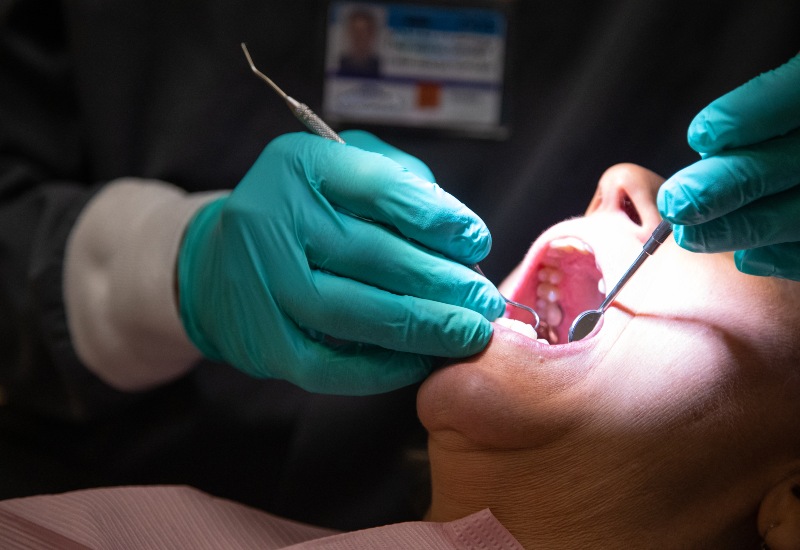Common Causes of Tooth Infections
If you’ve ever experienced a toothache that just won’t go away, it could be more than a simple cavity. For many patients in Antioch, IL, a persistent toothache may be the sign of a tooth infection. Understanding the causes of tooth infection, symptoms to watch for, and how to prevent them can help protect your dental health and avoid serious complications.
What Is a Tooth Infection?
A tooth infection, also known as a dental infection or tooth abscess, occurs when bacteria enter the pulp—the innermost part of the tooth containing nerves and blood vessels. Once bacteria reach this area, they can multiply quickly and cause painful swelling, pus buildup, and, if left untreated, spread to other parts of the body.

Common Causes of Tooth Infections
There are several common causes of tooth infections. Recognizing these risk factors can help you take preventive action:
- Untreated Cavities – When decay is left untreated, bacteria can spread deeper into the tooth.
- Cracked or Chipped Teeth – Openings in the enamel provide an entry point for bacteria.
- Worn or Failing Dental Work – Old fillings or crowns that no longer seal properly can allow bacteria to reach the tooth pulp.
- Gum Disease – Periodontal pockets from gum disease create pathways for bacteria to reach roots and bone.
- Trauma to the Tooth – Injuries that damage enamel or dentin increase infection risk.
- Poor Oral Hygiene – Inconsistent brushing and flossing allow plaque and bacteria to accumulate.
Symptoms of a Tooth Infection
A bacterial tooth infection often produces noticeable symptoms. Seek dental care right away if you experience:
- Severe or throbbing tooth pain
- Sensitivity to hot or cold
- Swelling in the face or gums
- A persistent bad taste or bad breath
- Pus drainage around the affected tooth
- Fever or general fatigue
Complications of Untreated Tooth Infections
Ignoring a dental infection can have serious health consequences. Untreated tooth abscesses may lead to:
- Spread of infection to the jawbone
- Development of facial cellulitis (skin infection)
- Sinus infections from upper tooth abscesses
- Sepsis, a potentially life-threatening infection throughout the body
- Loss of the affected tooth
How to Prevent Tooth Infections
Tooth infections are largely preventable with consistent oral hygiene and professional care. Focus on these steps to reduce your risk:
- Brush twice daily with fluoride toothpaste. Brushing in the morning and before bed helps remove plaque, bacteria, and food particles that can lead to decay. Using fluoride toothpaste also strengthens enamel, making teeth more resistant to infection.
- Floss once a day to remove plaque between teeth. Bacteria often hide where toothbrush bristles can’t reach. Daily flossing keeps these areas clean and prevents cavities from forming between teeth.
- Schedule regular dental checkups and professional cleanings. Seeing your dentist every six months allows problems to be caught early and gives your teeth a thorough cleaning to remove hardened plaque.
- Replace failing dental restorations promptly. Cracked or loose fillings and crowns create openings for bacteria. Timely repair or replacement keeps bacteria from reaching the tooth pulp.
- Wear a mouthguard to protect teeth from injury during sports. Trauma is one of the lesser-known causes of tooth infection, but chipped or broken teeth can quickly become infected if left untreated.
- Avoid excessive sugary snacks and drinks that promote decay. Sugar feeds bacteria in your mouth, increasing the risk of cavities that can develop into infections if ignored.
Treatment Options for Tooth Infections
If you’re diagnosed with a tooth infection, your dentist will recommend the best treatment based on severity. Common approaches include:
- Antibiotics – Prescribed to control the spread of infection, often used in combination with other treatments.
- Root Canal Therapy – Removes infected pulp, disinfects the canal, and seals the tooth to preserve its structure.
- Tooth Extraction – Necessary when the tooth cannot be saved and infection risk remains high.
- Incision & Drainage – Releases pus buildup from a severe abscess.
- Restorative Dental Work – Crowns or fillings are placed after treatment to restore function and strength.
Taking Action Against Tooth Infections
Knowing the causes of tooth infections and recognizing the warning signs early can save you from pain and complications. With proper preventive care, regular checkups, and timely treatment, you can protect your oral health and overall well-being.
If you suspect you may have a tooth infection in Antioch, IL, don’t wait. Contact Antioch Advanced Dentistry today to schedule an exam and receive the care you need to restore your smile.
Tooth Infection FAQ
Patients often have questions about how dental infections develop and how they are treated. Here are some of the most common concerns:
How Does a Dental Infection Start?
A dental infection begins when bacteria enter the pulp of a tooth, often through untreated cavities, cracks, or gum disease.
What Leads to a Dental Abscess?
A tooth abscess forms when bacteria cause pus to collect at the root of a tooth or in the surrounding gum tissue.
Can a Tooth Infection Go Away Without Treatment?
No. A tooth infection will not resolve on its own. Professional treatment is required to remove bacteria and prevent complications.
What Are the Main Causes of Tooth Infections?
Common causes include untreated decay, gum disease, trauma, failing dental work, and poor oral hygiene.
Is a Tooth Abscess Dangerous?
Yes. If untreated, a tooth abscess can spread infection to the jaw, sinuses, or bloodstream, which can become life-threatening.
What Are the Signs of a Dental Infection?
Severe pain, swelling, pus drainage, fever, and sensitivity are common warning signs.
How Are Tooth Infections Treated?
Treatments may include antibiotics, root canal therapy, extraction, or drainage depending on the severity of the infection.
Can Tooth Infections Be Prevented?
Yes. With good oral hygiene, routine dental visits, and timely restorative care, most tooth infections are preventable.
